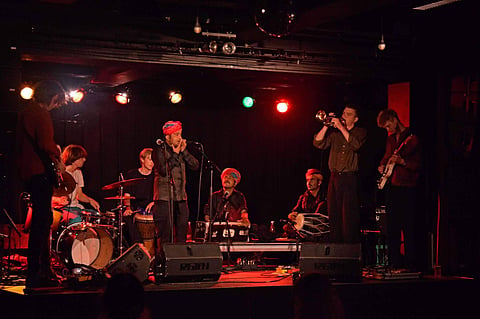

NEW DELHI: Banded together in amorphous brackets according to their state, region or caste, folk artistes rarely find individual fame, but an indie label hopes to change all that by giving regional talents their unique identity.
Ashutosh Sharma, who founded Amarrass Records with his childhood friend Ankur Malhotra in 2010, says he wanted to break the trend of "generic tunes from the dunes".
"We went to Rajasthan, Madhya Pradesh and to other areas. We found it strange when we started that none of the artistes are known by their names. Generally, in the folk scene, they're known by the region, or their caste, like Manganiyars. So we realised we need to break their identities," Sharma told PTI.
The Gurgaon-based label, which attempts to discover, organise and promote folk artistes who remain unknown due to lack of access and contacts, has brought musical acts such as Rajasthani folk veteran Lakha Khan, Sufi-Gypsy beatbox trio Barmer Boys, Palestinian-American band Painted Caves and DJ Ravana to the fore.
While they were scouting for talent in the folk genre, they realised that none of the musicians were identified by name, Sharma said.
"Since we started as a label, we recorded them, and they were all Manganiyars for everyone. So how do you differentiate the sound? They were all Manganiyars, Rajasthani music, and it's like a generic tune from the dunes," the 43-year-old said.
That was the challenge when Amarrass started out.
People called them to arrange gigs, saying "send over some four Rajasthani artistes" as if they were shopping for "potatoes" and "eggs", Sharma said.
"We felt like a shop. Would you ever ask for four 'English' musicians? You'll ask for a band, give a name or something. These people are just reduced to the 'aloo' situation. We used to have a laugh, because Rajasthan is the size of Western Europe. So do you want four artists from Western Europe? Can we be more specific?" Discussing the "identity crisis", he said sound from every corner of Rajasthan, for example, was unfairly dubbed 'Rajasthani' sound.
"But the sound from Jodhpur is very different from that of Jaisalmer, or of Barmer and so on.
We realised we need to work on all these aspects and create for each artist a unique identity," Sharma said.
To counter this rampant generalisation, Amarrass put out videos online and asked clients to go to its channel and tell them which artistes they were interested in.
"We told them, 'there are six artistes, tell us which one you want us to send?' We thought, hopefully, by the end of it, at least they can differentiate between the sound. That's how we started," Sharma said.
Eight years later, the situation has significantly improved with people recognising the musicians by their songs or names.
"Unless a folk artiste has made it to Bollywood, you don't really know them," the music enthusiast said.
Remembering the early days, Sharma said he and Malhotra went from village to village, searching out musicians and singling out who to work with.
As folk music, especially in Rajasthan, is passed on as oral inheritance from generation to generation, they spent a lot of time trying to record musicians for archival purposes.
"There were lots of senior artistes. Along with them, the old song books were dying too. We had a sense of urgency due to their age. It was not just about the music and so on, it was also a lot of archival work. All the folk songs are handed down orally. And there was like a huge block with the younger generation versus the older." Sharma said.
Hoping to reach out to a larger audience, the Amarrass duo also worked on bringing folk out of the interiors and fusing them into the modern.
Sharma gives the example of the Barmer Boys, who are known as contemporary folk musicians.
"So what Rais Khan brings in with the folk instruments and everything is that he also beatboxes.
When we started doing this and got him to beatbox on folk songs, it worked very well, because one, we were not changing any composition or anything, so wherever there was some more bass with the dholak etc, we asked Rais to add bass with beatboxing accordingly.
"We stuck to the original composition and then it doesn't feel like you've done fusion or anything, it kind of fits in with the song."
On July 8 (Sunday), Amarrass is organising a music evening, "Amarrass Nights at Qutub".
The line-up includes poet Jumma Khan, Vidya Talkies (film, folk and fusion), Underground alternative electronica producer Ravana and Barmer Boys.
"Earlier, we used to have these shows at Lodhi Garden. Now we are starting these nights next to Qutub Minar."